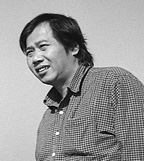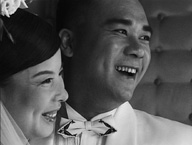Juror
Wu Yii-feng
 [Juror’s Statement]
[Juror’s Statement]
I am more and more confounded by documentary creation, thus giving rise to more and more skeptical questions.
Each on-site location, each event, each time and space, each subject implicates a choice.
My question is: has the subject chosen the object, or the other way around? Or does it matter at all, since it might have been just up to chance?
What mesmerizing power does creative documentary have, that it seems to have a hold on me, driving me to perpetual distraction? Does it spring from my own inner dissatisfaction? Or is it a conviction that I can change or help others? Or is it the longing for applause or approval to alleviate my insecurity? Perhaps fate has a hand in it?
Each scene, each shot, each sound, each ambience implicates a choice.
Was my choice correct? Can I rely on my rational sense? Can I rely on my emotions? Have I allowed my rational side to override my emotions? Or was it the other way around?
Did my filmed subject have a choice before the camera? What choices has he or she made? What choices have I made? Was the relationship between filmmaking and filmed subject interdependent? Or mutually exclusive? Or both? Was mutual exploitation involved? If that was the case, what is the definition of exploitation?
During each documentary representation, each expression of thought, has content determined the form, or has form drawn out the content? Did content rely on form, or has form changed the content? Were there blind spots in my choices?
Well then, what is truth? What is fiction? And what is the relation between the two? Doesn’t absolute truth exist? If not, is the truth that I can see true? Has fiction served to express the reality of what I saw, or has it become my means of escaping from confronting truth?
Since it is so hard to compare documentaries, what it boils down to is just a kind of choice.
Born 1960 in Yi-lan, Taiwan, Wu Yii-feng received his B.A. in theater from the Chinese Culture University. Documentary filmmaker, social activist and leading pioneer of Taiwan’s current communal media movement, he co-founded the FullShot Documentary Workshop in 1988. Major works include Moon Children (1990), screened at YIDFF ’91, and Chen Tsai-Gen and His Neighbors (1997), screened at YIDFF ’97. He participated in the YIDFF ’99 program, “Case Study: FullShot (Taiwan) and ‘Cinema Juku’ (Japan) / Spreading the Filmmaking Movement.” Gift of Life was screened in the International Competition at YIDFF 2003 and won the Runner-up Prize. His latest work is The House Masters (YIDFF 2005). |
Gift of Life
 TAIWAN / 2003 / Mandarin, Taiwanese / Color / Video / 148 min
TAIWAN / 2003 / Mandarin, Taiwanese / Color / Video / 148 min
Director, Producer: Wu Yii-feng
Photography: Yang Jong-ming
Editing: Lin Chin-hui
Sound: Lee Jong-wang
Narrators: Wu Yii-feng, James Liu
Source: Yamagata Documentary Film Library
Production Company: FullShot Communication Foundation
A major earthquake hit Taiwan in 1999 completely burying in landslides the village of Chiufen Erh Shan near the epicenter. Seven people from four different families look for the remains of their relatives in the aftermath of the quake. If anything, the days after the disaster weigh even more heavily on the stricken families. While carefully building trust, the director warmly observes how these families, though in the grip of loss, struggle toward recovery. This film is the first in the FullShot series Facing the Future and Walking Tall which will be screened as a special program at this year’s festival.
